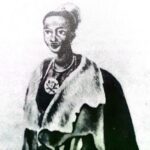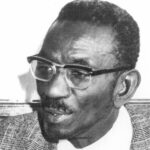THOMPSON, AUGUSTUS WILLIAM KOJO
- 7 Min Read
Augustus William Kojo Thompson (1880-February 26, 1950), generally known as Kojo Thompson, was a lawyer, a radical nationalist politician, and a pan-Africanist. An outstanding critic of the British government, he was leader of the Manbii (Townspeoples’) party in Accra. His reputation reached its height in the 1930’s.

PHOTO CAPTION: Augustus William Kojo SOURCE: EA Library
He was born at Winneba, 35 mi (56 km) west-south-west of Accra, in 1880, and was educated at the Collegiate (later Mfantsipim) School in Cape Coast, the Wesleyan School in Accra and the Wesleyan Boys’ High School in Nigeria. He went to England to study law, and was called to the bar at Lincoln’s Inn in 1914.
On returning to Accra he set up in private practice. He did not, however, participate in the National Congress of British West Africa when it was formed in 1920, or in its fight for elective representation during the years 1920-25. Instead, he concentrated on his law practice, entering the political arena only in 1924, when he played a leading role in the fight against the Municipal Corporations Ordinance, opposed by African opinion because of its tax provisions.
In 1926 he accepted nomination to the Legislative Council, having been proposed by the Mantsemei, which is to say the chiefs of Akumanji, Asare, Gbesi, and Sempe, four of the subdivisions of Accra. Thompson was subsequently defeated in the Legislative Council election of 1927 by J. Glover Addo of the Ratepayers Association, a political party in Accra led by Dr. F.V. Nanka Bruce and supported by C. Akilakpa Sawyerr and other prominent personalities who formed the elite of Accra society.
Kojo Thompson’s greatest asset as a nationalist politician was his willingness to insult the colonial regime, but he did not do so during the prosperous days of the late 1920s. In 1931 he was again defeated in the Accra Legislative Council election obtaining 558 votes against the 806 of his political opponent, Dr. Nanka-Bruce. Unlike Nanka-Bruce, Thompson was not very outstanding in his profession and had not achieved prominence in politics.
But by the mid 1930s, his popularity was at its height. He became the chief leader of the Mambii party, with the support of J.H. Glover Willoughly, a Ga, and Alfred J. Ocansey, an influential businessman and newspaper proprietor. A close associate of Dr. Nnamdi Azikiwe (later to become the first president of Nigeria), who was then the editor of the African Morning Post in Accra, of W.E. (Kobina) Sekyi the leader of the Aborigines’s Rights Protection Society (A.R.P.S), and of I.T.A. Wallace Johnson, the radical politician and revolutionary pan-Africanist from Sierra Leone.
Kojo Thompson was known in official circles as one who was usually in the forefront of any agitation against the government. Supported by Wallace Johnson’s West African Youth League, the A.R.P.S., and the Ocansey group of newspapers, he won a decisive victory over Dr. Nanka-Bruce in the 1935 Legislative Council election in Accra, securing 1,030 votes against Nanka-Bruce’s 926. At the subsequent election in April 1936, after Nanka-Bruce had petitioned the government to set aside the results of the 1935 election, Thompson was again elected by 1,022 votes to 867.
The political and economic situation in the Gold Coast has turned against the moderate wing of the elite to which Nanka-Bruce belonged, and it was this which changed the balance of political power in Accra in favour of the radical Kojo Thompson.
A fearless, independent, outspoken and conscience patriot and leader, Thompson was a “terror” in the legislature. He was known to be hostile to the colonial legislature, condemning native authorities at all times, and being highly critical of chiefs, especially Nana Sir Ofori Atta I of Akyem Abuakwa . He also criticised the moderate nationalist, whom he generally described as “collaborators” with the British administration. He made strong attacks upon government departments particularly the Law Offices Department for the inadequacy of their Africanisation policies.
On various occasions in the Legislative Council, he demanded amendments to the Town Councils Ordinance. He also bitterly attacked the structure and the entire composition of the Legislative Council itself, because it allowed the government to win every debate because of its “mechanical” majority. Describing this situation as “absurd” he emphasised the defect and illogicalities of the official majority instead of its advantages. He maintained that the official majority bred irresponsibility in the unofficial members, and held that it would be “more honest” to make the Council legislative in facts as well as in form, to abolish the official majority, to give the official members who remained in the council, freedom in voting, and to concentrate the responsibility of the government veto upon the governor alone.
A critic of the European commercial companies on the Gold Coast such as the United African Company (U.A.C), Thompson extended his hostility to the Association of West African Merchants, an organisation in whose the operation of the U.A.C was playing a dominant part.
He was a member of the Select Committee on Trade Unions and Trade Disputes established by the Legislative Council in 1941. In the same year, together with K. A. Korsah and Dr. J.B. Danquah, he formed a committee to draft a new constitution on behalf of the chiefs and intelligentsia.
The committee proposed among other things, an unofficial majority, with 7 municipal members, 3 from Accra and 2 each from Cape Coast and Sekondi, and 14 “country” members indirectly elected by state councils, who might be either chiefs or members of the intelligentsia. The center of the scheme was a ministerial system, whereby an elected African member would become a political head of a department, while the European officer remained the permanent head, in a relationship modeled on the British system. Although this well-founded and forward-looking scheme was naturally not accepted by the colonial administration of the day, the movement for constitutional reforms in which Thompson participated culminated in the 1946 Burns Constitution.
A member of the Committee of twelve, appointed to lead the Gold Coast agitation against the sedition and Waterworks Bills of 1934, that were opposed by educated African opinion, Thompson was also a Pan-African nationalist. A member of I.T.A. Wallace Johnson’s West African Youth League, he enthusiastically joined the pan-African protest demonstration against the Italian invasion of Ethiopia in 1935. He was a patron of the Ethiopian Defence Committee, set up to raise relief funds for Ethiopia, and chaired many of its meetings. Supported by the Manbii Party, the Ga Youth People’s Literacy Club, and the Muslim community in Accra, Thompson organised dances, mass meetings, and lectures about Ethiopia.
In June 1944, however, he was convicted on a charge of corruption and extortion. He was accused of having demanded 25,000 British Pounds Sterling from Mr. Barrow, the local chairman of the Association of West African Merchants, who was also an extraordinary member of the Legislative Council, as the price of withholding an attack upon the association which Thompson intended to deliver in the Council. This undelivered speech was published in full in the Spectator Daily, May 13-16, 1944, during the progress of the case.
Thompson was convicted by the West African Court of Appeal, and when convicted was disqualified for life from membership in the Legislative Council. This abruptly ended his political career as a Legislative Council member, a militant nationalist politician and a notable pan-Africanist. He died on February 26, 1950.
S.K.B. ASANTE




